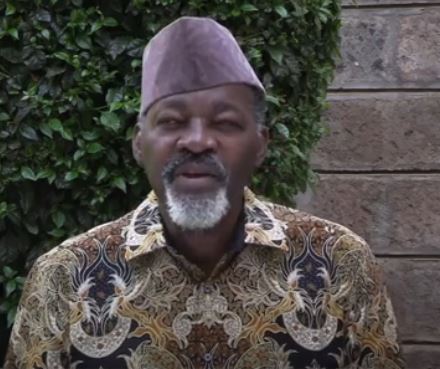Uhuru's cousin Kungu Muigai lands state job
Mudavadi appointed Muigai as a member of the Kenya Cultural Centre Council.
The case centres on judicial immunity, highlighting the need for consistent and coherent legal interpretation.
In Summary

Audio By Vocalize
 Businessman Kungu Muigai/SCREENGRAB
Businessman Kungu Muigai/SCREENGRAB Chief Justice Martha Koome will now decide on the appointment of a multi-judge bench to hear a constitutional petition touching on senior judges and businessman Kung’u Muigai.
This is after the High Court on Wednesday ruled that the case raises substantial questions of law requiring an expanded bench.
The suit centres on allegations made against Supreme Court Judge Isaac Lenaola and Court of Appeal Judge Milton Asike-Makhandia over their alleged handling of the long-running commercial dispute between Benjoh Amalgamated Ltd and Muiri Coffee Estate Ltd versus Kenya Commercial Bank (KCB).
The Judiciary has previously dismissed the claims, stating that Muigai’s allegations are unfounded and misrepresent the record of proceedings in the decades-old dispute.
Justice Bahati Mwamuye referred the file to the Chief Justice for empanelment, following an unopposed application by lawyer Nelson Havi, who represents the petitioner.
Havi had urged the court to certify that the petition, filed on November 6, raises complex constitutional issues, including the scope of judicial immunity under Article 160(5) of the Constitution.
The petition revolves around the conduct of Supreme Court Justice Isaac Lenaola and Court of Appeal Judge Milton Asike-Makhandia, who are listed as respondents alongside Muigai.
The Attorney-General and several state offices are also parties to the case.
Lawyers present, for respondents led by Peter Wanyama and Winnie Bett, did not oppose the plea for a larger bench.
Havi argued a related motion had already been certified as urgent by Justice Lawrence Mugambi, who directed that responses be files.
“My prayer is that the motion is not opposed,” he told the court, emphasising that the weight of the issues demands interpretation by more than one judge.
Wanyama said they supported the request, noting that the questions raised—particularly on judicial immunity and constitutional interpretation—were profound enough to warrant a three-judge bench.
"We don't oppose the request to appoint an uneven bench by CJ. It would be in public interest. Substantial question of law requiring interpretation,” he said, asking the court to grant them leave to file a response to the petition itself.
Before issuing his ruling, Justice Mwamuye posed pointed questions regarding the possibility of a conflict of interest, noting that the Chief Justice—who will be responsible for empanelling the bench—is also the chairperson of the Judicial Service Commission, listed in the case as the 9th respondent.
“Do you see any issue regarding that?” he asked.
He also sought clarification on whether there existed any related petition already being handled by a three-judge bench.
In response, Havi said concerns about the CJ’s dual role had been addressed in other proceedings, remarking that such overlaps were never contemplated as constitutional conflicts.
"It was not the contemplation of the constitution instigating judges in court," he said.
The counsel insisted that the Constitution still demands that the CJ act, even where her office appears among the respondents.
In a detailed ruling delivered on record, Justice Mwamuye found that the application indeed raises substantial constitutional questions.
He cited ongoing proceedings before another three-judge bench—Justices Kanyi Kimondo, Roselyne Aburili and Mugambi—on the issue of judicial immunity, underscoring the need for consistent legal interpretation.
He therefore certified the matter and directed that the file be transmitted to the Chief Justice “forthwith” for assignment of an uneven bench of not less than three judges.
The court made no order as to costs and ordered the registry to take immediate action.
The next steps will depend on Koome, who will decide the composition of the bench that will hear and determine the sensitive petition touching on sitting superior court judges.
The Benjoh–Muiri case dates back to 1989, when KCB advanced a loan facility to Benjoh Amalgamated Ltd, secured through charges on company property and a guarantee provided by Muiri Coffee Estate Ltd.
Several suits and counter-applications have since emerged.
In an earlier related matter, the High Court issued orders barring Muigai from making or publishing any statements deemed defamatory against Justice Lenaola, pending the full hearing and determination of the case.
Mudavadi appointed Muigai as a member of the Kenya Cultural Centre Council.